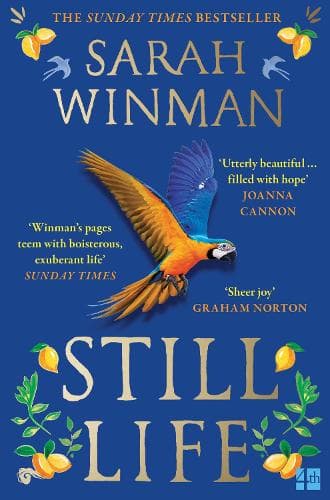
“All that love!” - Still Life - Sarah Winman
6th November 2022
My first post and I’ve learnt an important lesson: write your post when you finish the book and not months afterwards. I read ‘Still Life’ in the haze of summer; I write this in October on a grey and rainy Sunday afternoon. Yet when I finished it, I knew ‘Still Life’ was my book of the year and that’s why it has to be ‘Still Life’ for my first post, even if it has taken me months to get here.
And what a treat it is on this cold, rainy day to return to the warmth and joy of this book. Largely set in the aftermath of WW2, we follow Ulysses the son of a globe-maker and his band of eccentrics as they battle on in a run-down pub in East London. It’s a thin post-war existence and they are clinging on, clinging to each other, barely surviving.
Then their break comes and they leave London for Italy and the unknown - two men (one in shorts), a kid, a parrot and a suitcase full of cash piled into one van, an unlikely band of misfits off on a great adventure. In Florence, Ulysses’s heritage comes into its own as he rediscovers his globe making craft and builds a richer more colourful world for them all.
This is a book about family - how it can be found and forged in the most unlikely places. It’s about friendship and companionship. It thrums with love, in all its forms: the quiet kind and the loud. Like Piano Pete’s post-flood ballad, it’s “about good rising out of need” and “kindness and looking out for one another”.
Winman said of Still Life that she wrote it in the hope that: “someone who’s been bruised by the damage of the last couple of years and who might need to believe again in the goodness of people and a beautiful world might read it”. In that, she’s achieved her aim and more - it’s a soaring, warm, uplifting joy of a book.
Given all of this, it’s no mean feat that Winman ensures that it stays fresh and doesn’t slip into the saccharine. Partly this is down to her quick wit that runs throughout and works to provide emotional relief just when, like Cress, you think you might be overcome by “all that love”. It’s also down to the dialogue that zings as she moves with agility between her characters’ distinctive voices.
That pace is important as the narrative spans the arc of its characters’s lives. It feels like Winman is conscious of this and works hard to build a rhythm to sweep you up with her and them. She licks up phrases that reappear and reform over and over, imbuing her characters with a recognisable music of their own: “clack clack clack .. hips swaying, arms swinging”, you recognise Peg and her tune before she sashays into the scene.
Winman trained as an actor before becoming a novelist and this training has perhaps contributed to making her dialogue so sharp. She is also at times unapologetically cinematic: the prose is interrupted with a “Click!” and a “Flash!”, as characters are “caught forever” on camera and she forces her readers to stop and really picture (!) the scene.
Into this, Winman weaves in strands of the whimsical: Claud the parrot (my favourite character) with his preternatural disposition to one liners and surviving Colin’s wrath and Cress’s “visions” that result in well-timed windfalls are particular delights.
All this makes for an unusual combination and (with regret) I admit that not everyone I have recommended this to has loved it like I have. It’s undeniable that her style is busy - words fall onto and run into each other and it can leave you gasping to keep up - this takes some acclimatisation and some stamina, given the sweeping arc of the book.
I’ve often heard Winman compared to marmite. Luckily for me, like that delicious yeasty spread, I’m ready to dip my spoon in and lick it all up.
- The Book Gobbler